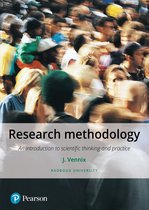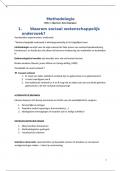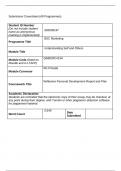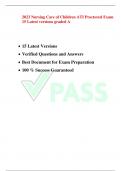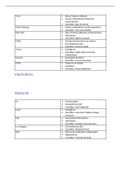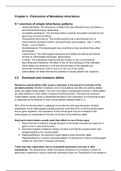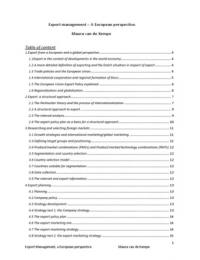Samenvatting MRI – Tentamenstof 2019
Theme 1: Introduction to research methods
1) Introduction, Methodological considerations (V. chapters 1,2,3)
2) Research design (V. chapters 4,5)
3) Conceptualization, operationalization, measurement (V. chapters 6,7,8)
Theme 2: Different research strategies
4) Quantitative empirical research: sampling and causal analysis (V. chapters 4,9)
5) Qualitative empirical research (V. chapters 10,11)
6) Practice oriented research/interventions, system dynamics (V. chapters 12,13)
Theme 3: Logic of inquiry and research design
7) The logic of inquiry and research design (V. chapter 14)
Theme 1: introduction, methodological considerations (chapters 1-8)
Lecture 1 – introduction, methodological considerations
Ontology: the way how we see the world the way two people look at the world may have
much in common but may also differ at essential points (how do we know what is real?)
Science: a method of inquiry – a way of learning and knowing things about the world around
us
Science deals with logic and with the real world (empirie)
making sense of the world in a specific way
Generation of new knowledge through systematic research
scientific assertion must have logical and empirical support
Agreement reality we need watching, thinking and knowing (Goethe)
reach an agreement on the way we work as scientists, how we watch,
how we translate our observations into knowledge (epistemology)
Epistemology = the science of knowing, systems of knowledge
Methodology = the science of finding out; procedures for scientific investigation
How is it investigated? Why is it investigated this way?
What is really real? Vennix
The premodern view – things are as they seem (positivism)
Critical rationalism (post positivism)
Opinions and views about the world questions about science creation of knowledge
3 ways of learning:
1) Deduction
Use in logic and in the sciences: the starting point is what we already know
2) Induction
We create new knowledge from gathering information in the world around us
(empirical situation) Vennix p.29
3) Abduction
, Creating a hypothesis which explains an empirical phenomenon Connection between
P and Q (Vennix p.26)
Four options
1) P is true, what about Q
2) P is not true, what about Q
3) Q is true, what about P
4) Q is not true, what about P
Example: When it rains the street gets wet
P = it rains
Q = the street gets wet
1) Easy When P then Q
2) Difficult what can we say about Q? it is not per definition true
3) Difficult What can we say about P? it is not per definition true
4) Easy When Q is not true then P is not true
Group think (Vennix p.52)
Inaccurate observations
Overgeneralizations (all…are…) Woman are better in multitasking then men
Selective perception/observation (looking for confirmation and common patterns)
“resistance to change” workers in general do not like changeresistance to change” workers in general do not like change
resistance to change = high when workers find out that the change agents don’t
have a clear view on the existing problems, and the change agents come up with
incomplete or contra-productive solutions
Illogical reasoning (the exception that proves the rule)
The exception that proves the rule: heard in many conversations: nonsense
An exception must make us alert that the proposition or the statement may be
incorrect
many statements begin with “resistance to change” workers in general do not like changeeverybody knows” based on horse sense
Authority and tradition
both might be helpful or an obstacle for scientific work
Authority: might help to steer your research in the right direction
Might hinder you to develop your own ideas
Tradition: helpful to stand your ground as the public opinion does not agree with
your ideas of working
Might hinder your work because of promoting no-go areas for research
Lecture 2 - research design
Research design = a design is actually a strategy or a plan of action regarding how to move
from a research question towards answers or conclusions (Vennix p. 86-87)
Research question research design outcomes
, The ‘Wheel of Science’ (Vennix p.74)
Theme 1: Introduction to research methods
1) Introduction, Methodological considerations (V. chapters 1,2,3)
2) Research design (V. chapters 4,5)
3) Conceptualization, operationalization, measurement (V. chapters 6,7,8)
Theme 2: Different research strategies
4) Quantitative empirical research: sampling and causal analysis (V. chapters 4,9)
5) Qualitative empirical research (V. chapters 10,11)
6) Practice oriented research/interventions, system dynamics (V. chapters 12,13)
Theme 3: Logic of inquiry and research design
7) The logic of inquiry and research design (V. chapter 14)
Theme 1: introduction, methodological considerations (chapters 1-8)
Lecture 1 – introduction, methodological considerations
Ontology: the way how we see the world the way two people look at the world may have
much in common but may also differ at essential points (how do we know what is real?)
Science: a method of inquiry – a way of learning and knowing things about the world around
us
Science deals with logic and with the real world (empirie)
making sense of the world in a specific way
Generation of new knowledge through systematic research
scientific assertion must have logical and empirical support
Agreement reality we need watching, thinking and knowing (Goethe)
reach an agreement on the way we work as scientists, how we watch,
how we translate our observations into knowledge (epistemology)
Epistemology = the science of knowing, systems of knowledge
Methodology = the science of finding out; procedures for scientific investigation
How is it investigated? Why is it investigated this way?
What is really real? Vennix
The premodern view – things are as they seem (positivism)
Critical rationalism (post positivism)
Opinions and views about the world questions about science creation of knowledge
3 ways of learning:
1) Deduction
Use in logic and in the sciences: the starting point is what we already know
2) Induction
We create new knowledge from gathering information in the world around us
(empirical situation) Vennix p.29
3) Abduction
, Creating a hypothesis which explains an empirical phenomenon Connection between
P and Q (Vennix p.26)
Four options
1) P is true, what about Q
2) P is not true, what about Q
3) Q is true, what about P
4) Q is not true, what about P
Example: When it rains the street gets wet
P = it rains
Q = the street gets wet
1) Easy When P then Q
2) Difficult what can we say about Q? it is not per definition true
3) Difficult What can we say about P? it is not per definition true
4) Easy When Q is not true then P is not true
Group think (Vennix p.52)
Inaccurate observations
Overgeneralizations (all…are…) Woman are better in multitasking then men
Selective perception/observation (looking for confirmation and common patterns)
“resistance to change” workers in general do not like changeresistance to change” workers in general do not like change
resistance to change = high when workers find out that the change agents don’t
have a clear view on the existing problems, and the change agents come up with
incomplete or contra-productive solutions
Illogical reasoning (the exception that proves the rule)
The exception that proves the rule: heard in many conversations: nonsense
An exception must make us alert that the proposition or the statement may be
incorrect
many statements begin with “resistance to change” workers in general do not like changeeverybody knows” based on horse sense
Authority and tradition
both might be helpful or an obstacle for scientific work
Authority: might help to steer your research in the right direction
Might hinder you to develop your own ideas
Tradition: helpful to stand your ground as the public opinion does not agree with
your ideas of working
Might hinder your work because of promoting no-go areas for research
Lecture 2 - research design
Research design = a design is actually a strategy or a plan of action regarding how to move
from a research question towards answers or conclusions (Vennix p. 86-87)
Research question research design outcomes
, The ‘Wheel of Science’ (Vennix p.74)

